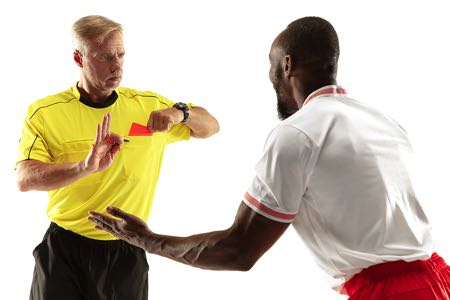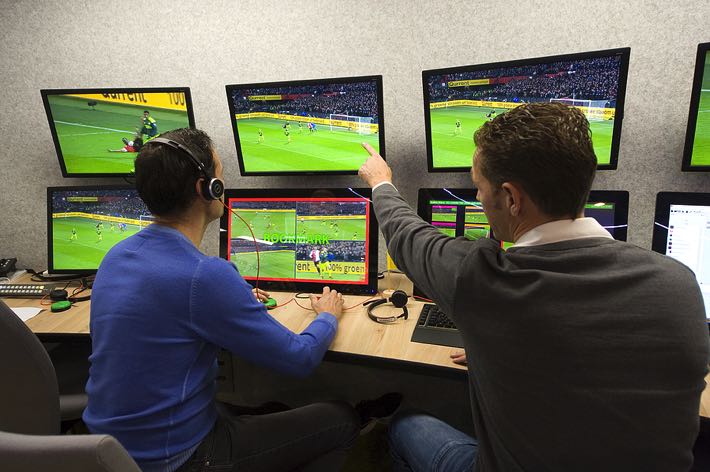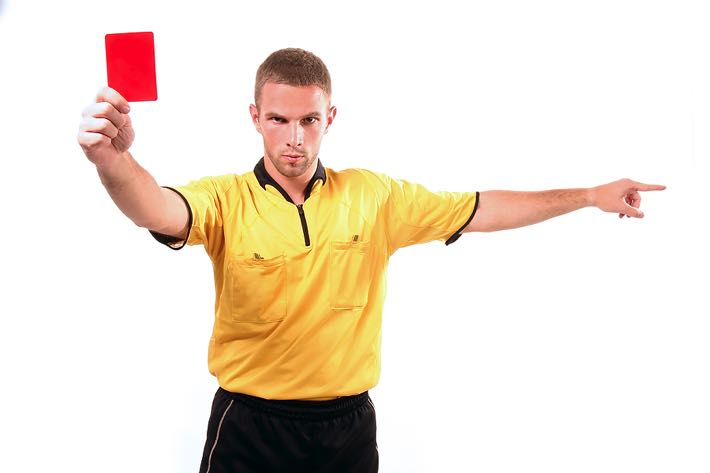 There are few positions in football as widely hated as the referee. The team of officials that take charge of matches are constantly derided and mocked by supporters, criticised by managers and argued with by players. The question is, why are the people that take charge of games so hated by everyone involved in matches? Whilst we’ll be talking about football specifically here, the reality is that the arguments that we’ll put forward could just as easily be used for other sports that require the use of a referee that is so influential.
There are few positions in football as widely hated as the referee. The team of officials that take charge of matches are constantly derided and mocked by supporters, criticised by managers and argued with by players. The question is, why are the people that take charge of games so hated by everyone involved in matches? Whilst we’ll be talking about football specifically here, the reality is that the arguments that we’ll put forward could just as easily be used for other sports that require the use of a referee that is so influential.
That word, ‘influential’, might well be the one that is most relevant when it comes to the manner in which everyone hates the referee. They have the power to see a game turn against your team or go in its favour, which can be all-important when it comes to winning the biggest trophies in the sport. Imagine a referee giving a penalty against your team in the Champions League final, seeing them spending the entire game on the back foot because of a decision that you don’t agree with? No wonder no one likes the person responsible.
We Don’t Know the Rules

Perhaps one of the biggest issues facing referees is that the average punter doesn’t really know the rules of the game. The International Football Association Board looks to be constantly updating and refining what the rules of the sport actually are, but the result of this is that your general football fan struggles to keep up with what the rules are from one minute to the next. The referee, meanwhile, is responsible for ensuring that they know exactly what the rules are, applying them as they see them during the course of the match.
This problem is compounded by the fact that commentators and pundits often have no idea of what the rules of the game are. As a result, you will hear people say things like, “Not for me, Clive,” as though there is some room for interpretation around a decision that has been made and the referee has leaned the wrong way. Whilst that is sometimes the case, more often than not there is no interpretation if you look at the rules of the game and realise that the decision that the referee has reached is the only one open to them.
That sort of ‘I don’t think that’s a foul’ attitude causes supporters watching on TV to also feel that there might be a degree of interpretation at play. Whilst that will occasionally be the case with fouls, penalties and sendings-off, it is definitely not the case with offsides. Even so, you can hear pundits say that a goal shouldn’t be disallowed because it didn’t feel like an offside. Sadly for football discourse, offside is binary and so such an attitude is doing nothing but muddying the waters around an already trick topic.
They’re Biased Against Your Team, Aren’t They?
The discourse from pundits and commentators often means that people watching at home, which is how most of us consume our football nowadays, can soon develop a feeling that the referee hates ‘their’ team. The notion that a decision could just as easily have gone the other way means that people end up believing that the referee has chosen not to give it to their team, which implies a degree of autonomy over decision making rather than the decision being reached because that it what the rules say.
The penalty given in the Champions League final, for example, could just as easily have been given as a dive, say, or a decision could have been made that it was a coming together of two players and no further action was needed. Instead, the referee has chosen to ignore the arguments of your team simply because they don’t like them. That sort of conspiracy theory isn’t helped by the idea that you then look out for it, ‘proving’ your point any time the referee gives a decision that goes against your team.
That isn’t to say that certain referees don’t have their own biases, of course. For a time, a large chunk of the officials in the Premier League were born in Greater Manchester, yet were still allowed to officiate games involving Manchester United, Manchester City and their rivals. A Mancunian referee, for example, will have grown up being told all the reasons why they should hate Liverpool, so it isn’t outrageous to suggest that that might play a part when making a decision in a match that might benefit a team from Merseyside.
That, of course, is likely to be nonsense. Yet it is a good demonstration of how it is that people can end up being convinced that a referee is firmly against the team that they support. For Manchester and Merseyside read Brighton and Crystal Palace, as an idea. It is easy to end up going down the road of believing conspiracies, especially if they tend to then ‘prove’ what it is that you’ve believed all along. The referee isn’t biased against your team, but it’s easy to believe that they are, which in turn can give you a reason to ‘hate’ them.
The Video Assistant Referee

When a decision was taken to introduce the Video Assistant Referee, there was a hope from many that it would result in a reduction of poor decision making from the officials that are charged with taking control of the matches that we love to watch. The idea was that ‘VAR’, as it became known, would give referees the chance to rule out shocking decisions. The problem was, in the United Kingdom at least, the same people that were put in charge of the matches that were doing such a poor job were also taking control of the VAR system.
For football lovers, the use of the VAR acronym meant that they forgot that it was just a person sat watching a replay on a television screen. That the person was also tasked with the high-bar of only looking to correct ‘clear and obvious errors’ meant that they were able to ignore something if they felt that it didn’t reach that threshold. As a result, many football fans began to suspect that the people in charge of the VAR were simply doing what they could to stop their mate and colleague from looking stupid by overturning something.
That the introduction of the VAR system didn’t do much to stop referees from making decisions that seem stupid to people watching the game at home hasn’t helped people be less full of hate towards the officials. Now, it almost feels as if they’re doubling-down on their mistake, compounding the issue by not realising their error and changing their mind on what is seen as a ‘poor decision’ by supporters. There is a general hatred towards VAR as a concept, when really what people should be annoyed by is the high-bar set for referees to overrule a colleague.
A Lack of Consistency
The reality of the rules of football is such that many of them are open to interpretation. What one referee sees as a foul, another might think was nothing more than an accidental coming together. As a result, you can end up in a situation where you can see pretty much identical incidents taking place in consecutive matches, only for the referees to make two completely different decisions. This obviously feeds into the idea that a referee is biased against your team, rather than the notion that they’ve just seen an incident different to another referee.
When the stakes are as high as they are in football matches, it is little wonder that people want someone to blame when things don’t go the way of their team. When you can then see referees making entirely different decisions from one week to the next or even see them and their colleagues make different choices to each other within consecutive matches, it becomes very difficult not to feel hatred towards the person that did something that damaged your team’s chances of success. It isn’t deliberate, but it can be hate-inducing.
The Two Sides Are Against One Another

It might seem relatively simple when you think about it, but referees are asked to take charge of football matches in which the two teams are going up against one another. As a result, any decision that they make will go in favour of one side and against another. This will cause the supporters, players and management of one of the two teams involved in an incident to be disappointed or even angry about what has happened, whilst the other will be delighted and will feel as though the referee has made the right choice in the circumstance.
When you have any two people, teams or groups up against one another, it is all but impossible to arbitrate a dispute without one side being annoyed or disappointed. In the history of football, there have only been a few occasions when a player has set out to deliberately hurt or injure an opposition player. Most of the time, they will protest their innocence because they will feel as though they made a fair attempt to get the ball, so a sending-off or penalty given against them will feel unfair. They will hate the referee for such perceived unfairness, with supporters then following suit.
It Isn’t Just a Game to Some
Famed Liverpool manager Bill Shankly once said, “Somebody said that football’s a matter of life and death to you, I said ‘listen, it’s more important than that’.” Whilst the quote has been bastardised since, the general feeling of it remains the case: for some, football isn’t just a game. There are millions, if not billions, of people all around the world that eat, sleep and breathe football. To them, the slightest decision that goes against their team is something that they will think about for days or weeks, stewing over repeatedly.
If they believe that the decision was made incorrectly, they will then hone in on the person that made it and begin to hate them for deciding what they decided. Whilst this isn’t a particularly healthy way to exist, it is how some people deal with things and referees end up being on the receiving end of their hatred and anger. It is why referees need to be strong-willed and willing to stick to their decisions, even in the face of tens of thousands of people screaming at them and letting them know how they feel about them.
Past Decisions Never Go Away

Anything that lasts for a long time in the memory is always likely to fester. Speak to an Evertonian about Pierluigi Collina and they would struggle to find a good word to say about the referee, with many remaining incredibly bitter about his decision to disallow a goal scored for the club by Duncan Ferguson in 2005. That was in a Champions League qualifying match, with the result at Villarreal’s El Madrigal seeing the Blue team from Merseyside crash out of the Champions League at the first time of asking in the new format.
It was a seismic moment for the club, with many supporters believing that Collina had been brought out of retirement specifically to ensure that they didn’t progress into the group stage of the competition. That the club’s supporters still hold such intense feelings of hatred towards the Italian referee more than a decade after it happened indicates that thoughts about such decisions never go away. It is perhaps not all that surprising, therefore, that referees are the focus of such anger and hatred from people all of the time.